利用RNN进行中文文本分类(数据集是复旦中文语料)
利用TfidfVectorizer进行中文文本分类(数据集是复旦中文语料)
1、训练词向量
数据预处理参考利用TfidfVectorizer进行中文文本分类(数据集是复旦中文语料) ,现在我们有了分词后的train_jieba.txt和test_jieba.txt,看一下部分内容:
fenci_path = '/content/drive/My Drive/NLP/dataset/Fudan/train_jieba.txt'
with open(fenci_path,'r',encoding='utf-8') as fp:
i = 0
lines = fp.readlines()
for line in lines:
print(line)
i += 1
if i == 10:
break
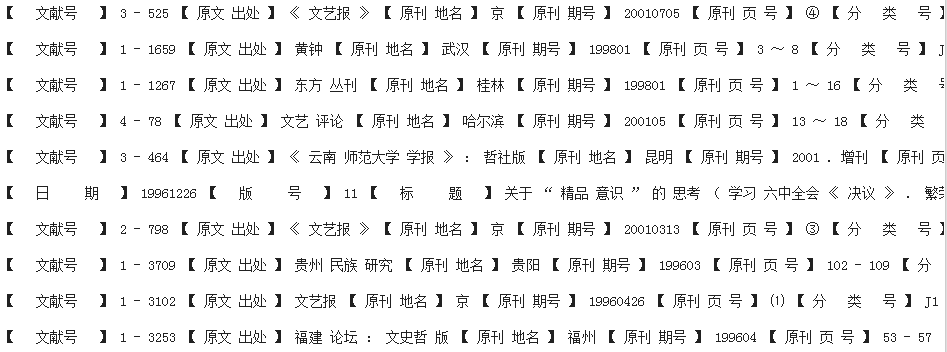
每一篇文章的分词结果和标签都是一行,标签之间使用'\t'隔开。
由于之前只是简略的进行分词,没有过滤掉一些停用词,接下来还需要进行一些处理,我们之前已经建立了停用词文本:stopwords.txt,现在我们要使用它。
def clean():
label_list = []
content_list = []
with open('/content/drive/My Drive/NLP/dataset/Fudan/train_jieba.txt','r',encoding='utf-8') as fp:
lines = fp.readlines()
for line in lines:
tmp = line.strip().split("\t")
content,label = tmp[0],tmp[1]
label_list.append(label)
out_list = []
for word in content.strip().split(' '):
if word not in stopwords_list and word != '':
out_list.append(word)
else:
continue
content_list.append(" ".join(out_list))
return content_list,label_list
content_list,label_list = clean()
i = 0
for content,label in zip(content_list,label_list):
print(content,label)
i += 1
if i == 10:
break

确实是过滤掉了一些停用词,如果效果不好可以根据当前任务情况继续扩充停用词 ,这里就暂时到这了。
对训练集和测试集进行同样的清理后保存:
def save(content_list,label_list):
path = '/content/drive/My Drive/NLP/dataset/Fudan/train_clean_jieba.txt'
fp = open(path,'w',encoding='utf-8')
for content,label in zip(content_list,label_list):
fp.write(content+str(label)+'\n')
fp.close()
save(content_list,label_list)
对测试集进行相同的操作时这一句 content,label = tmp[0],tmp[1] 出现了:list out of range
只需要多加一句:if len(tmp) == 2:过滤以下即可。
def clean():
label_list = []
content_list = []
with open('/content/drive/My Drive/NLP/dataset/Fudan/test_jieba.txt','r',encoding='utf-8') as fp:
lines = fp.readlines()
for line in lines:
tmp = line.strip().split("\t")
if len(tmp) == 2:
content,label = tmp[0],tmp[1]
label_list.append(label)
out_list = []
for word in content.strip().split(' '):
if word not in stopwords_list and word != '':
out_list.append(word)
else:
continue
content_list.append(" ".join(out_list))
return content_list,label_list
content_list,label_list = clean()
def save(content_list,label_list):
path = '/content/drive/My Drive/NLP/dataset/Fudan/test_clean_jieba.txt'
fp = open(path,'w',encoding='utf-8')
for content,label in zip(content_list,label_list):
fp.write(content+'\t'+str(label)+'\n')
fp.close()
save(content_list,label_list)
2、训练word2vec,构建词向量
我们新建一个data文件夹,然后将train_clean_jieba.txt和test_clean_jieba.txt放进去。这里word2vec的用法就不具体介绍了。
from gensim.models import Word2Vec
from gensim.models.word2vec import PathLineSentences
import multiprocessing
import os
import sys
import logging # 日志信息输出
program = os.path.basename(sys.argv[0])
logger = logging.getLogger(program)
logging.basicConfig(format='%(asctime)s: %(levelname)s: %(message)s')
logging.root.setLevel(level=logging.INFO)
logger.info("running %s" % ' '.join(sys.argv)) # check and process input arguments
# if len(sys.argv) < 4:
# print(globals()['__doc__'] % locals())
# sys.exit(1)
# input_dir, outp1, outp2 = sys.argv[1:4] # 训练模型
# 输入语料目录:PathLineSentences(input_dir)
# embedding size:100 共现窗口大小:5 去除出现次数5以下的词,多线程运行,迭代5次
model = Word2Vec(PathLineSentences('/content/drive/My Drive/NLP/dataset/Fudan/data/'),
size=100, window=5, min_count=5,
workers=multiprocessing.cpu_count(), iter=5)
model.save('/content/drive/My Drive/NLP/dataset/Fudan/Word2vec.w2v')
运行之后是这个样子:
2020-10-16 13:57:28,601: INFO: running /usr/local/lib/python3.6/dist-packages/ipykernel_launcher.py -f /root/.local/share/jupyter/runtime/kernel-52776eb8-5141-458e-8f04-3d3a0f11d46f.json
2020-10-16 13:57:28,606: INFO: reading directory /content/drive/My Drive/NLP/dataset/Fudan/data/
2020-10-16 13:57:28,608: INFO: files read into PathLineSentences:/content/drive/My Drive/NLP/dataset/Fudan/data/test_clean_jieba.txt
/content/drive/My Drive/NLP/dataset/Fudan/data/train_clean_jieba.txt
2020-10-16 13:57:28,610: INFO: collecting all words and their counts
2020-10-16 13:57:28,612: INFO: reading file /content/drive/My Drive/NLP/dataset/Fudan/data/test_clean_jieba.txt
/usr/local/lib/python3.6/dist-packages/smart_open/smart_open_lib.py:252: UserWarning: This function is deprecated, use smart_open.open instead. See the migration notes for details: https://github.com/RaRe-Technologies/smart_open/blob/master/README.rst#migrating-to-the-new-open-function
'See the migration notes for details: %s' % _MIGRATION_NOTES_URL
2020-10-16 13:57:28,627: INFO: PROGRESS: at sentence #0, processed 0 words, keeping 0 word types
2020-10-16 13:57:33,897: INFO: reading file /content/drive/My Drive/NLP/dataset/Fudan/data/train_clean_jieba.txt
2020-10-16 13:57:34,040: INFO: PROGRESS: at sentence #10000, processed 18311769 words, keeping 440372 word types
2020-10-16 13:57:39,060: INFO: collected 584112 word types from a corpus of 35545042 raw words and 19641 sentences
2020-10-16 13:57:39,062: INFO: Loading a fresh vocabulary
2020-10-16 13:57:39,768: INFO: effective_min_count=5 retains 183664 unique words (31% of original 584112, drops 400448)
2020-10-16 13:57:39,769: INFO: effective_min_count=5 leaves 34810846 word corpus (97% of original 35545042, drops 734196)
2020-10-16 13:57:40,320: INFO: deleting the raw counts dictionary of 584112 items
2020-10-16 13:57:40,345: INFO: sample=0.001 downsamples 19 most-common words
2020-10-16 13:57:40,345: INFO: downsampling leaves estimated 33210825 word corpus (95.4% of prior 34810846)
2020-10-16 13:57:40,951: INFO: estimated required memory for 183664 words and 100 dimensions: 238763200 bytes
2020-10-16 13:57:40,952: INFO: resetting layer weights
2020-10-16 13:58:15,170: INFO: training model with 2 workers on 183664 vocabulary and 100 features, using sg=0 hs=0 sample=0.001 negative=5 window=5
2020-10-16 13:58:15,174: INFO: reading file /content/drive/My Drive/NLP/dataset/Fudan/data/test_clean_jieba.txt
2020-10-16 13:58:16,183: INFO: EPOCH 1 - PROGRESS: at 1.11% examples, 481769 words/s, in_qsize 3, out_qsize 0
最后会生成:

接下来我们要使用模型,然后查看词以及其对应的词向量:
from gensim.models import Word2Vec
model = Word2Vec.load('/content/drive/My Drive/NLP/dataset/Fudan/Word2vec.w2v')
#所有词的数目
print(len(model.wv.index2word))
word_vector_dict = {}
for word in model.wv.index2word:
word_vector_dict[word] = list(model[word])
i = 0
for k,v in word_vector_dict.items():
print(k,v)
i += 1
if i == 5:
break
结果:
/usr/local/lib/python3.6/dist-packages/smart_open/smart_open_lib.py:252: UserWarning: This function is deprecated, use smart_open.open instead. See the migration notes for details: https://github.com/RaRe-Technologies/smart_open/blob/master/README.rst#migrating-to-the-new-open-function
'See the migration notes for details: %s' % _MIGRATION_NOTES_URL
183664
/usr/local/lib/python3.6/dist-packages/ipykernel_launcher.py:7: DeprecationWarning: Call to deprecated `__getitem__` (Method will be removed in 4.0.0, use self.wv.__getitem__() instead).
import sys
. [-2.8709345, -0.47548708, 0.86331373, 1.2737428, 2.3575406, 2.0570302, -0.53931403, 1.2613002, 0.5172711, -1.6461672, 1.3732913, 0.86122376, -0.21252058, 2.0552237, 0.9418685, 0.3278085, 0.588585, -0.7969468, -1.8978101, -0.43336996, -0.4861237, -0.25338736, -0.5043334, 0.6816521, 4.776381, 1.3428804, 1.9577577, 0.2862259, -1.3767976, 1.2107555, -0.21500991, 2.584977, -3.157238, -0.08438093, -1.4721884, -0.5101056, 0.39259034, 0.74332994, -0.6534138, 0.04722414, 2.2819524, 1.9146276, -0.13876201, -1.3124858, -1.2666191, 0.1447281, -0.5460836, 1.7340208, 0.5979215, -4.0311975, 0.11542667, -0.6193901, -0.058931056, 1.9952455, -0.8310607, -0.9370241, 0.2416995, -1.4236349, -0.41856983, -0.5497827, 1.2359228, 0.01779593, 0.9849501, 1.2311344, 1.8523129, 2.363041, 1.0974075, -1.2220355, 0.110876285, 0.17010106, -0.9745132, 1.1252304, 0.20266196, 1.6555228, -0.69005895, -0.15593, -2.6057267, 0.59146214, -0.29261357, 0.83551484, -2.1035368, 1.1904488, -1.0554912, -0.641594, 1.2142769, -1.4514563, 0.9756896, 0.52437824, -0.8486732, -3.358046, -0.69511414, 1.8128188, 0.45924014, -1.1814638, -0.48232678, -0.12257868, 0.23399891, -3.303544, -0.6949516, 0.5121446]
, [-2.618333, -1.8558567, 1.8535767, -0.21151228, 1.7623954, 4.3192573, 0.09128157, 1.5980599, 0.7076833, -1.7116284, 1.0046017, -0.15326972, 0.4059908, 0.9488417, 2.2387662, 0.20677945, -0.7107643, -2.758641, -0.3840812, 0.16083181, -2.1107125, 0.24038436, -1.2403657, 2.7272208, 1.9277251, 0.1489557, 2.1110923, 0.5919174, -2.1878436, 0.36604762, 0.31739056, 5.550043, -3.364542, 0.70963943, 0.13099277, -2.2344782, -0.39852622, -0.24567917, -1.3379095, -0.27352497, 1.3079535, -0.3681397, 1.2069534, -0.7798161, -0.18939576, -0.373316, -1.1903548, 1.2864754, -0.61407185, -3.171876, -1.2982743, 1.7416263, 0.73636365, 0.9905826, -0.3719811, 0.05626492, -2.6127703, 0.83886856, 0.66923296, 1.2502893, 0.9262052, 0.42174354, -1.484305, -0.17558077, 1.9593159, 4.8938365, 0.61336166, -1.0788211, -1.0862421, -0.5105872, -2.6575727, 2.091327, -0.23270625, 2.284086, -0.98763543, 0.28696263, -2.2600112, -3.2595506, 0.025764514, 1.3404137, -0.71168816, 2.2680438, 0.48311472, 0.36931905, 0.938186, -1.6107051, -0.15926446, 1.3209386, -0.801876, -2.303902, -0.436481, 0.8073558, 0.38733667, -0.26957598, -1.4267699, -0.8020603, 0.414129, -3.3372293, 0.6402213, -0.19667119]
) [-0.80750054, -0.6121455, -1.0710338, -2.9930687, 2.0432, 4.141169, -0.15709901, 0.81717527, -1.5162835, -3.1241925, -0.10446141, 1.010525, -3.1002233, 1.6662389, 0.9942944, 0.85855705, 2.0851238, -1.6842883, -2.9477723, -0.2876924, -0.6282387, -0.28349137, -3.1225855, 2.2486699, 1.2903367, 2.2274559, 0.27433106, 0.57094145, -1.1607213, -0.4642481, -1.0572903, 3.2884996, -1.2198547, -1.6459501, 0.67363816, -2.5827177, -0.25848988, -1.1222432, 0.21818976, 1.8232889, 2.8271437, -0.617807, -1.4015028, 1.2166779, -0.8353678, 0.34809938, -0.46445072, -0.084388316, 0.7031371, -4.1085744, -0.50515014, -3.1198754, 0.72745895, 1.4460654, 0.9307348, -2.758027, 0.018058121, -0.8535555, 0.6409112, 0.1882723, -1.1798013, 1.3632597, -0.1337653, 0.51510906, -0.5415601, 4.006427, -0.91912925, -3.4697065, -2.7071013, -0.6627828, -2.9176655, 1.0004271, 0.8123536, 2.1355457, -0.013824586, -0.10087594, 0.115427904, -0.46978354, 2.071482, 1.8447496, 0.99563545, 2.845259, 1.1902128, 0.02504066, 2.6136658, -0.6704431, -0.47580847, 1.1602222, 1.2428118, -2.3880181, -1.6264966, 0.74079543, -0.54774994, 1.0163826, -0.736786, -1.8922712, 0.5381837, -1.1004277, 0.33553576, 0.40247878]
( [-2.4204996, -1.0095057, 0.36723495, -1.9701287, 1.5028982, 1.0829349, -0.72509646, 1.0087173, -0.8471445, 0.21284652, -0.4341774, -0.9700405, -1.300372, 0.9491097, 3.350109, 1.4735373, 2.9339328, -0.3343834, -3.6445296, -0.41197056, -1.338803, 0.28331625, 0.10618747, -1.3739557, 1.1008664, 0.17741367, 0.45283958, 1.5100185, -1.7710751, 1.0186597, 0.7735381, 2.491264, 0.07328774, -1.1831408, -3.2152338, -2.5108373, -0.34185433, 0.34209073, -0.14207332, -2.194724, 1.0734048, -1.1285906, 1.9627889, -1.5373456, -1.9735036, 2.2119362, -0.21241511, 1.8747587, -0.67907304, -4.566279, -2.0092149, -1.3107775, 0.3573235, 0.9350223, 0.4996264, 1.6724535, -0.79917055, -0.14005652, 2.7869322, 0.80775166, 0.13976693, 0.5046433, -0.34996128, 0.3425343, 3.6427495, 2.3169396, -1.0229387, -4.0736656, 0.09746367, 0.79698503, -3.6760647, 0.53965265, -2.018294, 2.074562, -0.5203732, 0.06932237, -1.1419374, -1.2626162, 1.5128584, 1.1419917, -2.4901378, 3.0212705, 3.0879154, -1.0666283, 1.4316878, 0.25575432, 1.0118675, -0.210056, 1.5728005, -3.074708, -2.050965, 2.177831, -1.4306773, 0.5591415, -1.6649296, -2.479498, 0.27199566, -0.7439327, 1.065499, -1.7122517]
中 [-1.4137642, 0.07996469, -0.84706545, 0.9269082, -0.5876861, 0.9406654, -2.7666419, 0.013692471, 0.7948517, -3.7575817, -3.0255227, -0.1290994, 0.15024899, 1.7057111, -1.783816, 1.2594382, -0.80985075, 1.2856516, -1.1239803, 0.33939472, 1.7681189, 0.5220787, -3.093301, -0.72288835, -0.27703923, 0.6913874, -0.62614673, 0.16310164, 1.6016583, -0.9558958, -0.65395266, -0.81403816, -0.35800782, -1.6817136, 0.0038451876, 0.924515, 0.7525097, -0.55127585, -2.7082217, -0.5226547, 0.65330553, -0.13418457, -0.11833907, -4.0032573, -0.56922513, -1.323926, 0.097095534, 1.0593758, 0.48968402, -0.6643793, 1.4596446, -2.0395942, 2.7365487, -1.0603454, -0.54655385, -2.8474076, 0.3412293, 0.96139586, 0.9478409, 0.7041088, 4.2240176, -0.5293954, -3.0038583, -3.1062794, 0.55948454, 0.37824842, 0.13522537, 0.00925424, -1.3225565, 0.4190299, 0.57395566, -1.2779645, -0.6505884, 3.8218825, -1.2415665, -0.06736558, -1.7298794, 1.6446227, -1.0105107, -1.0007042, -0.7136034, 1.7795436, -0.8232877, 0.3342558, -1.9837192, -0.043689013, 0.4572051, 0.5139073, 1.9465048, 1.3884708, -1.18057, 3.5671742, -2.4114704, 1.324688, -0.14609453, -0.724388, 0.6249127, 0.600731, -2.1366022, 2.421635]
还是有一些标点符号没有去除,可以补充下停止词文本,这里就暂时这样了。
之后我们将词语保存在一个文件中,将对应的词向量保存在另一个文件中。
vocabulary_path = '/content/drive/My Drive/NLP/dataset/Fudan/vocabulary.txt'
vector_path = '/content/drive/My Drive/NLP/dataset/Fudan/vector.txt'
fp1 = open(vocabulary_path,'w',encoding='utf-8')
fp2 = open(vector_path,'w',encoding='utf-8')
for word in model.wv.index2word:
fp1.write(word+'\n')
vector_list = model[word]
vector_str_list = [str(num) for num in vector_list]
fp2.write(" ".join(vector_str_list)+"\n")
fp1.close()
fp2.close()
接着我们还需要进行一系列的转换操作:
import keras
#将词汇表中的单词映射成id
def word2id():
vocabulary_path = '/content/drive/My Drive/NLP/dataset/Fudan/vocabulary.txt'
fp1 = open(vocabulary_path,'r',encoding='utf-8')
word2id_dict = {}
for i,line in enumerate(fp1.readlines()):
word2id_dict[line.strip()] = i
print(word2id_dict)
fp1.close()
return word2id_dict
#得到文本内容及对应的标签
def get_content_label():
data = '/content/drive/My Drive/NLP/dataset/Fudan/data/train_clean_jieba.txt'
fp = open(data,'r',encoding='utf-8')
content_list = []
label_list = []
for line in fp.readlines():
line = line.strip().split('\t')
if len(line) == 2:
content_list.append(line[0])
label_list.append(line[1])
print(content_list[:5])
print(label_list[:5])
fp.close()
return content_list,label_list
#得到标签对应的id
def get_label_id():
label = '/content/drive/My Drive/NLP/dataset/Fudan/label.txt'
label2id_dict = {}
fp = open(label,'r',encoding='utf-8')
for line in fp.readlines():
line = line.strip().split('\t')
label2id_dict[line[0]] = line[1]
#print(label2id_dict)
return label2id_dict
#将文本内容中的词替换成词对应的id,并设定文本的最大长度
#对标签进行one-hot编码
def process():
max_length = 600
data = '/content/drive/My Drive/NLP/dataset/Fudan/data/train_clean_jieba.txt'
contents,labels = get_content_label()
word_to_id = word2id()
cat_to_id = get_label_id()
data_id = []
label_id = []
for i in range(len(contents)):
data_id.append([word_to_id[x] for x in contents[i] if x in word_to_id])
label_id.append(cat_to_id[labels[i]]) # 使用keras提供的pad_sequences来将文本pad为固定长度
x_pad = keras.preprocessing.sequence.pad_sequences(data_id, max_length)
y_pad = keras.utils.to_categorical(label_id, num_classes=len(cat_to_id)) # 将标签转换为one-hot表示
return x_pad,y_pad
x_pad,y_pad = process()
print(x_pad[0])
print(y_pad[0])
print(len(x_pad),len(y_pad))
结果:
[ 3464 2264 1227 1015 1844 34754 3464 2264 5781 2933
1214 1499 519 2558 603 68784 50747 2706 1499 2127
2558 3388 2912 1128 4617 1499 2127 3464 2264 4
1499 2127 1244 5645 22020 55754 3464 2264 4419 5781
2933 3464 2264 2558 603 1538 80 1104 1844 4
1363 2821 5602 3464 2264 1244 5645 5308 2558 603
1244 5645 1844 34754 3464 2264 238 1499 2558 603
5602 5308 2127 2558 603 538 762 4437 2127 2558
603 3388 2264 1024 1139 538 1818 1024 1139 1851
1851 2327 139 929 1548 314 160 2602 482 10087
13030 1730 40786 4754 139 562 366 6089 4 562
160 2602 85 2433 5781 80 466 1139 1503 4453
4617 1244 5645 3560 6058 3459 4 562 160 2602
2558 603 3829 2517 410 4585 2558 603 3464 2264
3848 423 11739 5645 3560 6058 431 3950 2127 1499
2127 35 423 11739 5645 319 2558 603 1499 2127
3773 4383 4 1503 1499 2558 603 1994 4419 1257
1553 603 926 6065 1257 1553 603 1376 431 1538
80 1090 2646 6506 7261 519 2558 603 1994 4419
2456 2127 2558 603 20160 1553 603 1182 1090 16160
4414 1137 1503 1844 34754 4 864 22754 1844 34754
1730 3464 2264 2558 603 68784 3464 2264 2558 603
5658 16754 6608 2558 603 3468 1776 4780 11201 5634
429 1994 4419 38671 1730 3464 2264 755 2332 25839
828 2558 603 3464 2264 429 3174 144 2840 429
3174 1305 1164 2094 41825 33950 7 4 562 3464
2264 3773 4383 7131 787 2264 3773 4383 3773 4383
5326 8 1336 22020 2181 3464 2264 2558 603 915
429 19614 11857 1844 34754 905 5372 429 3140 1116
1371 780 858 780 22020 55754 3464 2264 2558 603
4526 1032 1227 1015 1104 1844 17286 5308 2456 1104
2193 429 3464 2264 2558 603 1336 3464 2264 755
2558 603 755 888 2127 2558 603 1182 1090 139
1499 2193 429 3464 2264 2558 603 220 201 144
1844 34754 5223 3355 296 1321 0 1844 2602 5368
4815 319 144 160 2602 915 429 2332 1996 1227
1015 2114 384 2691 25814 2261 160 2602 1844 12894
1996 20370 15958 1844 34754 4711 3994 1996 0 1844
34754 1866 3241 6754 201 1305 2181 6754 201 2558
603 2558 603 2193 429 2127 1090 4617 4982 2706
1025 3119 10028 3464 2264 2558 603 1116 160 1182
1090 950 384 1215 26769 116663 160 2602 1996 864
2578 1864 5223 431 19429 3355 296 2578 1864 1851
1851 2327 5223 0 1844 34754 238 2433 3464 2264
458 39604 787 395 8527 30953 519 1090 4617 1321
201 3119 2710 1321 201 519 1321 201 2558 603
1321 201 1844 10087 0 1844 34754 1540 431 861
562 787 1844 864 10 1411 787 2264 9301 519
58253 13086 8527 3560 5648 3464 2264 10478 2181 1844
34754 4 0 1844 34754 85 1077 2578 1864 1548
8068 2578 1864 4 562 787 2264 1692 1938 2924
1692 3837 2181 3683 7285 35 1844 34754 864 238
1499 139 519 2806 1321 562 2236 301 395 50747
2706 2574 429 35 254 2806 1321 1227 176 2574
429 562 731 2281 139 1127 4668 3459 716 1548
8068 2578 1864 2927 1636 2400 1851 139 14986 3773
12279 80 3275 8128 2033 1723 7131 867 3468 2790
1938 22337 2895 32268 2790 1723 1938 22337 2067 4914
1723 1938 22337 7 3812 8246 4899 4178 8553 8595
5487 1553 731 9237 45100 482 429 2684 1221 8]
[0. 0. 0. 0. 0. 0. 0. 0. 0. 1. 0. 0. 0. 0. 0. 0. 0. 0. 0. 0.]
9803 9803
最后我们再定义一个将数据制作成batch的操作:
def batch_iter(x, y, batch_size=64):
"""生成批次数据"""
data_len = len(x)
num_batch = int((data_len - 1) / batch_size) + 1 indices = np.random.permutation(np.arange(data_len))
x_shuffle = x[indices]
y_shuffle = y[indices] for i in range(num_batch):
start_id = i * batch_size
end_id = min((i + 1) * batch_size, data_len)
yield x_shuffle[start_id:end_id], y_shuffle[start_id:end_id]
3、ternsorflow中的RNN
RNN在tensorflow中有静态RNN,动态RNN之分。两者差异挺大,我们在使用tensorflow进行RNN实践时,主要注意以下几点:
- 静态RNN一般需要将所有句子padding成等长处理,这点与TextCNN一样的,但动态rnn稍显灵活一点,动态RNN中,只要一个batch中的所有句子等长就可以;
- 静态RNN的输入与输出是list或二维张量;动态RNN中输入输出的是三维张量,相对与TextCNN,少了一维;
- 静态RNN生成过程所需的时间更长,网络所占内存会更大,但模型中会带有每个序列的中间信息,利于调试;动态RNN生成过程所需时间相对少,所占内存相对更小,但模型中只有最后的状态。
本文介绍使用动态RNN进行文本分类。
(1)我们首先要定义模型
class TRNNConfig(object):
"""RNN配置参数""" # 模型参数
embedding_dim = 100 # 词向量维度
seq_length = 600 # 序列长度
num_classes = 20 # 类别数
vocab_size = 183664 # 词汇总数 num_layers= 2 # 隐藏层层数
hidden_dim = 128 # 隐藏层神经元
rnn = 'gru' # lstm 或 gru dropout_keep_prob = 0.8 # dropout保留比例
learning_rate = 1e-3 # 学习率 batch_size = 128 # 每批训练大小
num_epochs = 10 # 总迭代轮次 print_per_batch = 20 # 每多少轮输出一次结果
save_per_batch = 10 # 每多少轮存入tensorboard class TextRNN(object):
"""文本分类,RNN模型"""
def __init__(self, config):
self.config = config # 三个待输入的数据
self.input_x = tf.placeholder(tf.int32, [None, self.config.seq_length], name='input_x')
self.input_y = tf.placeholder(tf.float32, [None, self.config.num_classes], name='input_y')
self.keep_prob = tf.placeholder(tf.float32, name='keep_prob') self.rnn() def rnn(self):
"""rnn模型""" def lstm_cell(): # lstm核
return tf.contrib.rnn.BasicLSTMCell(self.config.hidden_dim, state_is_tuple=True) def gru_cell(): # gru核
return tf.contrib.rnn.GRUCell(self.config.hidden_dim) def dropout(): # 为每一个rnn核后面加一个dropout层
if (self.config.rnn == 'lstm'):
cell = lstm_cell()
else:
cell = gru_cell()
return tf.contrib.rnn.DropoutWrapper(cell, output_keep_prob=self.keep_prob) # 词向量映射
with tf.device('/cpu:0'):
embedding = tf.get_variable('embedding', [self.config.vocab_size, self.config.embedding_dim])
embedding_inputs = tf.nn.embedding_lookup(embedding, self.input_x) with tf.name_scope("rnn"):
# 多层rnn网络
cells = [dropout() for _ in range(self.config.num_layers)]
rnn_cell = tf.contrib.rnn.MultiRNNCell(cells, state_is_tuple=True) _outputs, _ = tf.nn.dynamic_rnn(cell=rnn_cell, inputs=embedding_inputs, dtype=tf.float32)
last = _outputs[:, -1, :] # 取最后一个时序输出作为结果 with tf.name_scope("score"):
# 全连接层,后面接dropout以及relu激活
fc = tf.layers.dense(last, self.config.hidden_dim, name='fc1')
fc = tf.contrib.layers.dropout(fc, self.keep_prob)
fc = tf.nn.relu(fc) # 分类器
self.logits = tf.layers.dense(fc, self.config.num_classes, name='fc2')
self.y_pred_cls = tf.argmax(tf.nn.softmax(self.logits), 1) # 预测类别 with tf.name_scope("optimize"):
# 损失函数,交叉熵
cross_entropy = tf.nn.softmax_cross_entropy_with_logits(logits=self.logits, labels=self.input_y)
self.loss = tf.reduce_mean(cross_entropy)
# 优化器
self.optim = tf.train.AdamOptimizer(learning_rate=self.config.learning_rate).minimize(self.loss) with tf.name_scope("accuracy"):
# 准确率
correct_pred = tf.equal(tf.argmax(self.input_y, 1), self.y_pred_cls)
self.acc = tf.reduce_mean(tf.cast(correct_pred, tf.float32))
模型大致结构如下:
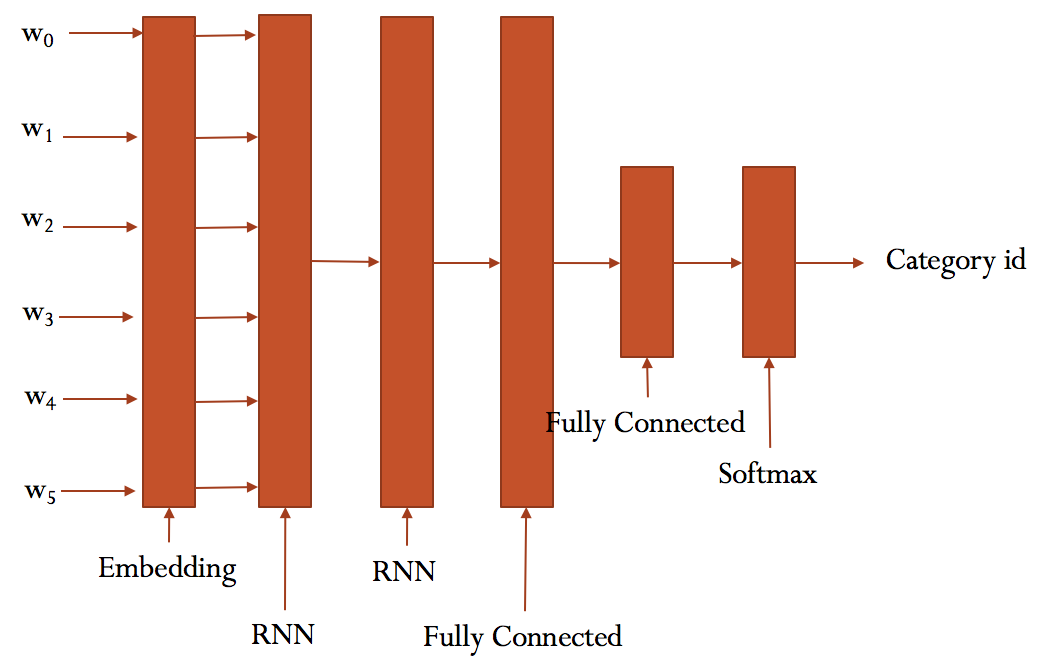
(2)定义一些辅助函数
def evaluate(sess, x_, y_):
"""评估在某一数据上的准确率和损失"""
data_len = len(x_)
batch_eval = batch_iter(x_, y_, 128)
total_loss = 0.0
total_acc = 0.0
for x_batch, y_batch in batch_eval:
batch_len = len(x_batch)
feed_dict = feed_data(x_batch, y_batch, 1.0)
loss, acc = sess.run([model.loss, model.acc], feed_dict=feed_dict)
total_loss += loss * batch_len
total_acc += acc * batch_len return total_loss / data_len, total_acc / data_len def get_time_dif(start_time):
"""获取已使用时间"""
end_time = time.time()
time_dif = end_time - start_time
return timedelta(seconds=int(round(time_dif))) def feed_data(x_batch, y_batch, keep_prob):
feed_dict = {
model.input_x: x_batch,
model.input_y: y_batch,
model.keep_prob: keep_prob
}
return feed_dict
(3)定义训练主函数
def train():
print("Configuring TensorBoard and Saver...")
# 配置 Tensorboard,重新训练时,请将tensorboard文件夹删除,不然图会覆盖
tensorboard_dir = 'tensorboard/textrnn'
if not os.path.exists(tensorboard_dir):
os.makedirs(tensorboard_dir) tf.summary.scalar("loss", model.loss)
tf.summary.scalar("accuracy", model.acc)
merged_summary = tf.summary.merge_all()
writer = tf.summary.FileWriter(tensorboard_dir) save_dir = 'checkpoints/textrnn'
save_path = os.path.join(save_dir, 'best_validation') # 最佳验证结果保存路径
# 配置 Saver
saver = tf.train.Saver()
if not os.path.exists(save_dir):
os.makedirs(save_dir) print("Loading training and validation data...")
# 载入训练集与验证集
start_time = time.time()
train_dir = '/content/drive/My Drive/NLP/dataset/Fudan/data/train_clean_jieba.txt'
val_dir = '/content/drive/My Drive/NLP/dataset/Fudan/data/test_clean_jieba.txt'
x_train, y_train = process(train_dir, config.seq_length)
x_val, y_val = process(val_dir, config.seq_length)
time_dif = get_time_dif(start_time)
print("Time usage:", time_dif) # 创建session
session = tf.Session()
session.run(tf.global_variables_initializer())
writer.add_graph(session.graph) print('Training and evaluating...')
start_time = time.time()
total_batch = 0 # 总批次
best_acc_val = 0.0 # 最佳验证集准确率
last_improved = 0 # 记录上一次提升批次
require_improvement = 1000 # 如果超过1000轮未提升,提前结束训练 flag = False
for epoch in range(config.num_epochs):
print('Epoch:', epoch + 1)
batch_train = batch_iter(x_train, y_train, config.batch_size)
for x_batch, y_batch in batch_train:
feed_dict = feed_data(x_batch, y_batch, config.dropout_keep_prob) if total_batch % config.save_per_batch == 0:
# 每多少轮次将训练结果写入tensorboard scalar
s = session.run(merged_summary, feed_dict=feed_dict)
writer.add_summary(s, total_batch) if total_batch % config.print_per_batch == 0:
# 每多少轮次输出在训练集和验证集上的性能
feed_dict[model.keep_prob] = 1.0
loss_train, acc_train = session.run([model.loss, model.acc], feed_dict=feed_dict)
loss_val, acc_val = evaluate(session, x_val, y_val) # todo if acc_val > best_acc_val:
# 保存最好结果
best_acc_val = acc_val
last_improved = total_batch
saver.save(sess=session, save_path=save_path)
improved_str = '*'
else:
improved_str = '' time_dif = get_time_dif(start_time)
msg = 'Iter: {0:>6}, Train Loss: {1:>6.2}, Train Acc: {2:>7.2%},' \
+ ' Val Loss: {3:>6.2}, Val Acc: {4:>7.2%}, Time: {5} {6}'
print(msg.format(total_batch, loss_train, acc_train, loss_val, acc_val, time_dif, improved_str)) feed_dict[model.keep_prob] = config.dropout_keep_prob
session.run(model.optim, feed_dict=feed_dict) # 运行优化
total_batch += 1 if total_batch - last_improved > require_improvement:
# 验证集正确率长期不提升,提前结束训练
print("No optimization for a long time, auto-stopping...")
flag = True
break # 跳出循环
if flag: # 同上
break
if __name__ == '__main__':
print('Configuring RNN model...')
config = TRNNConfig()
model = TextRNN(config)
train()
运行部分结果:
Epoch: 8
Iter: 540, Train Loss: 0.25, Train Acc: 92.19%, Val Loss: 0.62, Val Acc: 83.12%, Time: 0:22:00
Iter: 560, Train Loss: 0.28, Train Acc: 91.41%, Val Loss: 0.61, Val Acc: 84.18%, Time: 0:22:48
Iter: 580, Train Loss: 0.25, Train Acc: 91.41%, Val Loss: 0.59, Val Acc: 84.61%, Time: 0:23:36 *
Iter: 600, Train Loss: 0.39, Train Acc: 89.06%, Val Loss: 0.62, Val Acc: 83.94%, Time: 0:24:24
Epoch: 9
Iter: 620, Train Loss: 0.17, Train Acc: 95.31%, Val Loss: 0.59, Val Acc: 84.75%, Time: 0:25:12 *
Iter: 640, Train Loss: 0.24, Train Acc: 92.97%, Val Loss: 0.57, Val Acc: 85.21%, Time: 0:26:00 *
Iter: 660, Train Loss: 0.23, Train Acc: 94.53%, Val Loss: 0.61, Val Acc: 83.84%, Time: 0:26:47
Iter: 680, Train Loss: 0.33, Train Acc: 90.62%, Val Loss: 0.6, Val Acc: 85.02%, Time: 0:27:35
Epoch: 10
Iter: 700, Train Loss: 0.23, Train Acc: 92.97%, Val Loss: 0.63, Val Acc: 83.92%, Time: 0:28:22
Iter: 720, Train Loss: 0.29, Train Acc: 92.97%, Val Loss: 0.59, Val Acc: 85.37%, Time: 0:29:10 *
Iter: 740, Train Loss: 0.13, Train Acc: 96.09%, Val Loss: 0.59, Val Acc: 84.92%, Time: 0:29:57
Iter: 760, Train Loss: 0.32, Train Acc: 91.41%, Val Loss: 0.62, Val Acc: 84.72%, Time: 0:30:44
在tensorboard可视化结果:

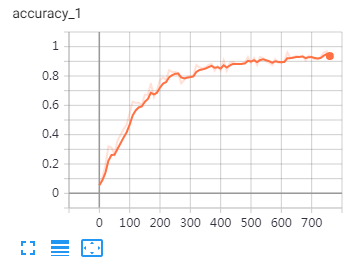
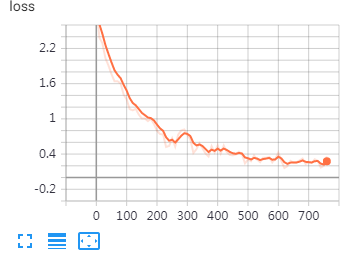
同时会生成保存的文件:
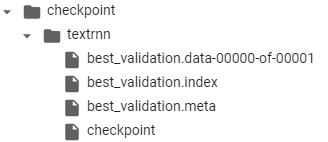
进行测试,这里我们的测试集和验证集是同样的:
def test():
print("Loading test data...")
start_time = time.time()
test_dir = '/content/drive/My Drive/NLP/dataset/Fudan/data/test_clean_jieba.txt'
x_test, y_test = process(test_dir, config.seq_length)
save_path = 'checkpoint/textrnn/best_validation'
session = tf.Session()
session.run(tf.global_variables_initializer())
saver = tf.train.Saver()
saver.restore(sess=session, save_path=save_path) # 读取保存的模型 print('Testing...')
loss_test, acc_test = evaluate(session, x_test, y_test)
msg = 'Test Loss: {0:>6.2}, Test Acc: {1:>7.2%}'
print(msg.format(loss_test, acc_test)) batch_size = 128
data_len = len(x_test)
num_batch = int((data_len - 1) / batch_size) + 1 y_test_cls = np.argmax(y_test, 1)
y_pred_cls = np.zeros(shape=len(x_test), dtype=np.int32) # 保存预测结果
for i in range(num_batch): # 逐批次处理
start_id = i * batch_size
end_id = min((i + 1) * batch_size, data_len)
feed_dict = {
model.input_x: x_test[start_id:end_id],
model.keep_prob: 1.0
}
y_pred_cls[start_id:end_id] = session.run(model.y_pred_cls, feed_dict=feed_dict) # 评估
print("Precision, Recall and F1-Score...")
categories = get_label_id().values()
print(metrics.classification_report(y_test_cls, y_pred_cls, target_names=categories)) # 混淆矩阵
print("Confusion Matrix...")
cm = metrics.confusion_matrix(y_test_cls, y_pred_cls)
print(cm) time_dif = get_time_dif(start_time)
print("Time usage:", time_dif)
if __name__ == '__main__':
print('Configuring RNN model...')
config = TRNNConfig()
model = TextRNN(config)
test()
结果:这里9833是因为最后面多出了一行空行
Test Loss: 0.61, Test Acc: 84.53%
Precision, Recall and F1-Score...
/usr/local/lib/python3.6/dist-packages/sklearn/metrics/_classification.py:1272: UndefinedMetricWarning: Precision and F-score are ill-defined and being set to 0.0 in labels with no predicted samples. Use `zero_division` parameter to control this behavior.
_warn_prf(average, modifier, msg_start, len(result))
precision recall f1-score support 0 0.00 0.00 0.00 61
1 0.87 0.90 0.88 1022
2 0.28 0.32 0.30 59
3 0.87 0.91 0.89 1254
4 0.60 0.40 0.48 52
5 0.74 0.88 0.80 1026
6 0.95 0.94 0.94 1358
7 0.50 0.02 0.04 45
8 0.40 0.24 0.30 76
9 0.84 0.88 0.86 742
10 0.60 0.09 0.15 34
11 0.00 0.00 0.00 28
12 0.91 0.92 0.92 1218
13 0.85 0.85 0.85 642
14 0.36 0.12 0.18 33
15 0.44 0.15 0.22 27
16 0.88 0.88 0.88 1601
17 0.27 0.45 0.34 53
18 0.33 0.12 0.17 34
19 0.65 0.52 0.58 468 accuracy 0.85 9833
macro avg 0.57 0.48 0.49 9833
weighted avg 0.83 0.85 0.84 9833 Confusion Matrix...
[[ 0 3 2 43 0 3 0 0 1 1 0 0 0 1
0 0 2 0 0 5]
[ 0 916 0 13 0 6 0 0 0 1 0 0 21 0
0 0 49 8 2 6]
[ 0 2 19 2 1 1 3 0 1 0 0 0 5 5
2 2 1 13 1 1]
[ 0 8 1 1147 0 45 1 0 2 7 0 0 4 5
0 0 12 3 1 18]
[ 0 2 1 5 21 4 2 0 1 3 0 0 2 1
0 0 6 2 0 2]
[ 0 4 0 23 1 898 0 0 3 13 0 0 0 0
0 0 67 0 1 16]
[ 0 0 1 9 0 1 1278 0 0 8 1 0 6 46
0 0 7 1 0 0]
[ 0 0 1 9 0 16 1 1 0 11 0 0 0 0
0 1 2 0 0 3]
[ 0 1 3 7 0 23 1 0 18 2 0 0 0 2
1 0 1 3 0 14]
[ 0 0 0 2 2 29 2 0 1 651 1 0 0 0
0 0 3 1 0 50]
[ 0 0 0 1 0 4 0 1 2 15 3 0 0 0
0 0 2 1 0 5]
[ 0 0 0 3 0 1 4 0 0 0 0 0 5 6
0 0 6 3 0 0]
[ 0 32 5 5 3 0 15 0 0 0 0 0 1117 13
1 1 21 3 2 0]
[ 0 6 15 8 3 0 33 0 4 1 0 0 18 546
0 0 0 8 0 0]
[ 0 2 2 0 1 2 0 0 0 1 0 0 11 6
4 0 3 0 0 1]
[ 0 0 0 2 0 1 8 0 2 0 0 0 2 6
0 4 1 0 0 1]
[ 0 59 3 21 1 55 3 0 3 2 0 0 25 0
2 0 1416 5 1 5]
[ 0 7 9 4 0 1 0 0 3 0 0 0 0 0
0 0 2 24 0 3]
[ 0 4 5 0 1 2 0 0 1 0 0 0 5 0
1 0 2 8 4 1]
[ 0 4 1 15 1 118 0 0 3 61 0 0 0 2
0 1 10 7 0 245]]
Time usage: 0:01:01
上面的模型是没有加入到我们预先训练好的词向量的,接下来,我们要将自己的词向量导入到模型中,再进行训练。
4、将词向量加入到网络中
首先我们需要对词向量进行处理:生成一个词嵌入,然后将词向量赋值给对应的位置
import numpy as np
def export_word2vec_vectors():
word2vec_dir = '/content/drive/My Drive/NLP/dataset/Fudan/vector.txt'
trimmed_filename = '/content/drive/My Drive/NLP/dataset/Fudan/vector_word.npz'
file_r = open(word2vec_dir, 'r', encoding='utf-8')
#(183664,100)
lines = file_r.readlines()
embeddings = np.zeros([183664, 100])
for i,vec in enumerate(lines):
vec = vec.strip().split(" ")
vec = np.asarray(vec,dtype='float32')
embeddings[i] = vec
np.savez_compressed(trimmed_filename, embeddings=embeddings)
export_word2vec_vectors()
之后用这种方式进行读取:
def get_training_word2vec_vectors(filename):
with np.load(filename) as data:
return data["embeddings"]
接下来看看我们需要修改的地方:
在模型配置文件中加入:
pre_trianing = None
vector_word_npz = '/content/drive/My Drive/NLP/dataset/Fudan/vector_word.npz'
在模型中修改:
#embedding = tf.get_variable('embedding', [self.config.vocab_size, self.config.embedding_dim])
embedding = tf.get_variable("embeddings", shape=[self.config.vocab_size, self.config.embedding_dim],
initializer=tf.constant_initializer(self.config.pre_trianing))
embedding_inputs = tf.nn.embedding_lookup(embedding, self.input_x)
在main中修改:
if __name__ == '__main__':
print('Configuring RNN model...')
config = TRNNConfig()
config.pre_trianing = get_training_word2vec_vectors(config.vector_word_npz)
model = TextRNN(config)
train()
然后我们运行:
Epoch: 8
Iter: 540, Train Loss: 0.17, Train Acc: 92.97%, Val Loss: 0.44, Val Acc: 87.80%, Time: 0:22:14
Iter: 560, Train Loss: 0.17, Train Acc: 96.09%, Val Loss: 0.39, Val Acc: 89.10%, Time: 0:23:04 *
Iter: 580, Train Loss: 0.14, Train Acc: 94.53%, Val Loss: 0.4, Val Acc: 88.71%, Time: 0:23:51
Iter: 600, Train Loss: 0.16, Train Acc: 92.97%, Val Loss: 0.39, Val Acc: 89.10%, Time: 0:24:37
Epoch: 9
Iter: 620, Train Loss: 0.14, Train Acc: 93.75%, Val Loss: 0.4, Val Acc: 88.78%, Time: 0:25:25
Iter: 640, Train Loss: 0.16, Train Acc: 96.09%, Val Loss: 0.42, Val Acc: 88.67%, Time: 0:26:13
Iter: 660, Train Loss: 0.13, Train Acc: 96.09%, Val Loss: 0.42, Val Acc: 88.95%, Time: 0:26:59
Iter: 680, Train Loss: 0.18, Train Acc: 94.53%, Val Loss: 0.4, Val Acc: 89.17%, Time: 0:27:47 *
Epoch: 10
Iter: 700, Train Loss: 0.19, Train Acc: 94.53%, Val Loss: 0.43, Val Acc: 89.06%, Time: 0:28:35
Iter: 720, Train Loss: 0.046, Train Acc: 98.44%, Val Loss: 0.4, Val Acc: 89.72%, Time: 0:29:22 *
Iter: 740, Train Loss: 0.11, Train Acc: 96.09%, Val Loss: 0.44, Val Acc: 88.86%, Time: 0:30:10
Iter: 760, Train Loss: 0.059, Train Acc: 97.66%, Val Loss: 0.39, Val Acc: 89.47%, Time: 0:30:57
再进行测试:
Test Loss: 0.4, Test Acc: 89.72%
Precision, Recall and F1-Score...
precision recall f1-score support 0 0.48 0.38 0.42 61
1 0.93 0.91 0.92 1022
2 0.58 0.51 0.54 59
3 0.95 0.93 0.94 1254
4 0.75 0.40 0.53 52
5 0.87 0.91 0.89 1026
6 0.93 0.98 0.96 1358
7 0.41 0.31 0.35 45
8 0.64 0.57 0.60 76
9 0.89 0.91 0.90 742
10 0.57 0.12 0.20 34
11 0.36 0.18 0.24 28
12 0.94 0.95 0.95 1218
13 0.93 0.92 0.92 642
14 0.42 0.15 0.22 33
15 0.33 0.07 0.12 27
16 0.90 0.94 0.92 1601
17 0.56 0.60 0.58 53
18 0.36 0.15 0.21 34
19 0.75 0.74 0.75 468 accuracy 0.90 9833
macro avg 0.68 0.58 0.61 9833
weighted avg 0.89 0.90 0.89 9833 Confusion Matrix...
[[ 23 0 0 17 0 2 1 1 0 5 0 0 2 1
0 0 3 6 0 0]
[ 0 926 0 0 0 3 0 0 0 0 0 0 7 1
0 0 72 1 0 12]
[ 0 1 30 0 1 0 13 0 0 0 0 1 0 5
0 1 6 1 0 0]
[ 8 6 0 1165 0 21 4 0 1 14 0 0 8 3
0 0 8 3 0 13]
[ 0 0 4 0 21 5 4 0 3 0 0 1 4 0
0 1 9 0 0 0]
[ 3 5 0 12 2 932 0 6 11 4 0 0 3 0
0 0 28 1 0 19]
[ 0 0 1 1 0 0 1336 0 0 0 0 3 3 12
0 0 2 0 0 0]
[ 3 0 0 10 0 8 0 14 0 6 0 0 0 1
0 0 1 0 0 2]
[ 1 1 2 0 0 15 2 0 43 0 0 0 0 3
0 0 0 8 0 1]
[ 0 0 1 2 1 0 2 5 1 675 3 0 0 0
0 0 1 0 0 51]
[ 0 0 0 2 0 2 0 4 2 10 4 0 0 0
0 0 1 0 0 9]
[ 0 0 1 1 0 0 9 0 0 0 0 5 0 6
0 1 4 1 0 0]
[ 1 14 0 0 0 2 13 0 2 0 0 0 1161 5
0 0 17 0 3 0]
[ 0 6 1 3 0 0 28 0 0 1 0 0 12 589
0 0 1 1 0 0]
[ 0 1 2 0 0 1 0 0 0 0 0 1 14 2
5 0 4 0 3 0]
[ 0 0 6 0 0 1 12 0 1 0 0 1 0 2
0 2 2 0 0 0]
[ 1 27 3 4 2 32 3 3 0 0 0 0 4 0
1 1 1509 3 3 5]
[ 8 2 0 3 1 1 0 0 0 0 0 1 2 0
1 0 2 32 0 0]
[ 0 1 1 0 0 0 1 0 0 0 0 1 12 2
5 0 6 0 5 0]
[ 0 4 0 5 0 48 4 1 3 46 0 0 0 4
0 0 8 0 0 345]]
Time usage: 0:01:02
使用了我们预先训练的词向量之后,发现比随机生成的词向量相比,确实能够提升网络的性能。
最后做个总结:
使用RNN进行文本分类的过程如下:
- 获取数据;
- 无论数据是什么格式的,我们需要对其进行分词(去掉停用词)可以根据频率进行选择前N个词(可选);
- 我们需要所有词,并对它们进行编号;
- 训练词向量(可选),要将训练好的向量和词编号进行对应;
- 将数据集中的句子中的每个词用编号代替,对标签也进行编号,让标签和标签编号对应;
- 文本可使用keras限制它的最大长度,标签进行onehot编码;
- 读取数据集(文本和标签),然后构建batchsize
- 搭建模型并进行训练和测试;
至此从数据的处理到文本分类的整个流程就已经全部完成了,接下来还是对该数据集,使用CNN进行训练和测试。欢迎关注我的微信公众号-西西嘛呦,它不橡博客园发表那样长篇大论的文章,只希望能够带给你有用的知识。
参考:
https://www.jianshu.com/p/cd9563a3f6c9
https://github.com/cjymz886/text-cnn
https://github.com/gaussic/text-classification-cnn-rnn/
利用RNN进行中文文本分类(数据集是复旦中文语料)的更多相关文章
- 基于tensorflow的文本分类总结(数据集是复旦中文语料)
代码已上传到github:https://github.com/taishan1994/tensorflow-text-classification 往期精彩: 利用TfidfVectorizer进行 ...
- 利用CNN进行中文文本分类(数据集是复旦中文语料)
利用TfidfVectorizer进行中文文本分类(数据集是复旦中文语料) 利用RNN进行中文文本分类(数据集是复旦中文语料) 上一节我们利用了RNN(GRU)对中文文本进行了分类,本节我们将继续使用 ...
- 基于Text-CNN模型的中文文本分类实战 流川枫 发表于AI星球订阅
Text-CNN 1.文本分类 转眼学生生涯就结束了,在家待就业期间正好有一段空闲期,可以对曾经感兴趣的一些知识点进行总结. 本文介绍NLP中文本分类任务中核心流程进行了系统的介绍,文末给出一个基于T ...
- 基于Text-CNN模型的中文文本分类实战
Text-CNN 1.文本分类 转眼学生生涯就结束了,在家待就业期间正好有一段空闲期,可以对曾经感兴趣的一些知识点进行总结. 本文介绍NLP中文本分类任务中核心流程进行了系统的介绍,文末给出一个基于T ...
- 万字总结Keras深度学习中文文本分类
摘要:文章将详细讲解Keras实现经典的深度学习文本分类算法,包括LSTM.BiLSTM.BiLSTM+Attention和CNN.TextCNN. 本文分享自华为云社区<Keras深度学习中文 ...
- Chinese-Text-Classification,用卷积神经网络基于 Tensorflow 实现的中文文本分类。
用卷积神经网络基于 Tensorflow 实现的中文文本分类 项目地址: https://github.com/fendouai/Chinese-Text-Classification 欢迎提问:ht ...
- 中文文本分类之TextRNN
RNN模型由于具有短期记忆功能,因此天然就比较适合处理自然语言等序列问题,尤其是引入门控机制后,能够解决长期依赖问题,捕获输入样本之间的长距离联系.本文的模型是堆叠两层的LSTM和GRU模型,模型的结 ...
- 中文文本分类之CharCNN
文本分类是自然语言处理中一个非常经典的任务,可用的模型非常多,相关的开源代码也非常多了.这篇博客用一个CNN模型,对新闻文本进行分类. 全部代码有4个模块:1.数据处理模块(命名为:cnews_loa ...
- 利用TfidfVectorizer进行中文文本分类(数据集是复旦中文语料)
1.对语料进行分析 基本目录如下: 其中train存放的是训练集,answer存放的是测试集,具体看下train中的文件: 下面有20个文件夹,对应着20个类,我们继续看下其中的文件,以C3-Art为 ...
随机推荐
- 理解C#回调函数
序言 本篇主要学习了C#回调函数的定义使用.欢迎各位大牛的指导. 正文 回调函数是什么? 回调函数就是一个通过函数指针调用的函数.如果你把函数的指针(地址)作为参数传递给另一个函数,当这个指针被用来调 ...
- Unity接入多个SDK的通用接口开发与资源管理(二)
接着上篇,本篇对SDK接口进行封装.在开始之前,需要先了解下面知识. (1)unity与android之间的交互 unity通过下面方式调用android中的函数: 方法一: AndroidJavaC ...
- 在 Flutter 中使用 TensorFlow Lite 插件实现文字分类
如果您希望能有一种简单.高效且灵活的方式把 TensorFlow 模型集成到 Flutter 应用里,那请您一定不要错过我们今天介绍的这个全新插件 tflite_flutter.这个插件的开发者是 G ...
- 分布式系统监视zabbix讲解五之web监控
Web 监控 概况 你可以使用 Zabbix 检查几个网站可用性方面. 如果要使用 Web 检测功能,必须在 编译Zabbix 的时候加入 cURL(libcurl) 的支持. 要使用 Web 监控, ...
- v-charts 绘制柱状图、条形图、水球图、雷达图、折线图+柱状图,附官网地址
v-charts 官网地址:https://v-charts.js.org/#/ 柱状图: <template> <ve-histogram :data="chartDat ...
- 联赛模拟测试5 涂色游戏 矩阵优化DP
题目描述 分析 定义出\(dp[i][j]\)为第\(i\)列涂\(j\)种颜色的方案数 然后我们要解决几个问题 首先是求出某一列涂恰好\(i\)种颜色的方案数\(d[i]\) 如果没有限制必须涂\( ...
- RocketMQ系列:rocketmq运维控制台使用详解(全网独家)
搭建好了RocketMQ的console之后,直接在浏览器打开http://{你的ip}:8080 默认会进入到驾驶舱(dashboard). 总览 整体横向菜单分为八个部分: 运维:主要是设置nam ...
- Linux常用字段
cd 切换路径 vim,vi 打开文档 ls 查看文件信息 chmod 修改文件或目录的权限 useradd 添加用户 cat 查看纯文本文件(少内容) rm 删除文件或目录 mv 剪切文件或文件重 ...
- burp suite 之 intruder(入侵者)
intruder:包括自动提交请求的功能 登录密码 撞库 注入 脱裤 Fuzz Burp intruder包含四个模块: Target:攻击的网站目标的详情信息 Positions :用来设置攻击类型 ...
- 零基础学习Kmeans聚类算法的原理与实现过程
内容导入: 聚类是无监督学习的典型例子,聚类也能为企业运营中也发挥者巨大的作用,比如我们可以利用聚类对目标用户进行群体分类,把目标群体划分成几个具有明显特征区别的细分群体,从而可以在运营活动中为这些细 ...
